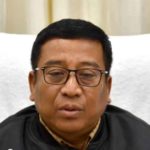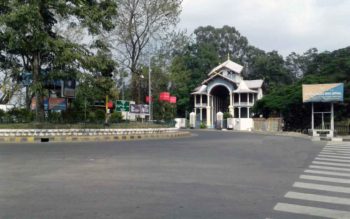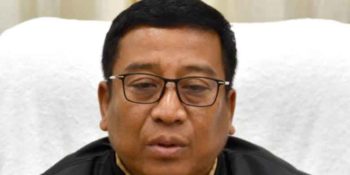Imphal: Co-ordinating Committee on Manipur Integrity ( COCOMI) on Tuesday wrote to the Prime Minister of India Narendra Modi and Union home minister Amit Shah reminding of its stance in regard to the Government of India’s initiatives to bring out a final deal under the Framework Agreement which was signed on August 3, 2015 as a Government of India and NSCN (I-M) peace process and subsequently joined by other Naga groups.
The co-ordinating committee is a conglomerate body of civil bodies comprising of UCM, AMUCO, CCSK, HERICOUN, LIPUL and MMWO.
On behalf of the people of Manipur the committee expressed ‘serious concern’ of the people of Manipur on the various newspaper reports that the final agreement between the Government of India and the NSCN (I-M) will be signed by the month of September and with the other Naga Groups by October, 2020.
It may be reiterated that the people of Manipur are highly charged due to such reports and as the representatives of the people of Manipur on this matter, the committee said in the memorandum.
It recalled that during the discussion held between the central leaders and representatives of COCOMI on November 25, 2019, the representatives had placed strong and vociferous opposition to any merger of any territory of Manipur to Nagaland, creation of a Pan Naga Cultural Body/Province/Territorial Council or any separate Administrative Units or Divisions or Setups with detailed grounds for such oppositions, and had also emphasised that even if the Goverment of India accepts the Naga flag, it should be applicable only in Nagaland and not in any part of Manipur and that no act which will lower the dignity of the Manipur Legislative Assembly by bypassing it for any acts resulting out of the agreement shall be acceptable or applicable to Manipur.
It was assured that if any matter concerning the state of Manipur is involved, the matter will first be consulted with the CSOs of Manipur; in other words no unilateral decisions will be made by the Government of India and that the people of Manipur must be made aware of the progress of the talks by the central representatives if there is any provisions which may impact the state of Manipur and its people, the committee said.
“Despite the assurances given by Your Honour which we verily believe that Your Honour will keep, till now there is no communication to us on the progress of the ongoing Peace Talk thereby implying that the Government of India had not accepted any proposal from the NSCN (I-M) which may have an effect on the state of Manipur and its people,” it said.
However, the various media reports on the finalisation of the Final Peace Agreement within the month of September or October have caused apprehension among the people of Manipur which had led to the submission of this Memorandum, it added.
A copy of the memorandum submitted to the Prime Minister of India on December 28, 2017 and a copy of the Memorandum submitted to the Union home minister on November 25, 2019 were enclosed.
In the memorandum the committee said Manipur is an old nation with history and written records of more than 2000 years and its boundary which was retained from 1834 onwards must not be altered.
Manipur is a multi-ethnic, multi-lingual, multi-cultural and multi-religious state which had evolved through time in harmony and no action should be initiated to bring disharmony among the various communities.
The segregation of the Hills men and Plainsmen was started by the British under their divide and rule policy which was perpetuated by insertion of Article 371 C.
The age-old symbiotic relationship was disturbed by the ethnic based identity politics practiced by NSCN(IM) which engulfed the entire region. The Bangkok Agreement of 2001 sowed a series of violent agitations leading to the withdrawal of the offensive term “without territorial limits” from the agreement and thus the present talk should be confined to the state of Nagaland only as declared officially by the then Prime Minister Atal Bihari Vajpayee on July 27, 2001.
Though the Peace Talks started with the NSCN(I-M) it was extended to NNPG and if the outcome will impact other states, it should have been a multilateral talks and any act which may impact Manipur without consulting Manipur as an equal partner cannot be accepted and will encourage further taking up of arms by other ethnic groups.
The so called Naga National Flag and Pan Naga Cultural Body encompassing all Nagas in Nagaland the three neighbouring states of Arunachal Pradesh, Assam and Manipur and creation of a Naga Territorial Council each within the three neighbouring states was vehemently opposed and the Flag if permitted must be allowed to be flown only within the jurisdiction of Nagaland and not in other, states; the Pan Naga Cultural Body, if at all need to be constituted must not be a constitutional or statutory body as it is fraught with contradictions as to the nomenclature of the term Naga and will lead to further marginalisation of the smaller tribes, the committee said.
The territorial Boundary of Manipur as defined in the First Schedule of the Constitution presently must be protected through an amendment of Article 3 & 4 of the Constitution.
The so-called Pan Naga Cultural Body will ultimately involve in politics like the case of SGPC leading to anti-national activities. Therefore, no ethnic based statutory body/ structure should be created.
Modern political history of India taught that once a territorial council was established it led to demand for separate statehood and the Kukis will also demand similar Council. Any Territorial Council based on ethnicity in Manipur will communalise the territorial divisions leading to balkanisation of the state besides ethnic cleansing as seen in the new nations carved out from the erstwhile Yugoslavia through violence, hence any administrative arrangements under the provision of the Sixth Schedule of the Indian Constitution is not acceptable under any circumstances, it added.
The final agreement / the talk should be considered only for Nagaland as the Naga plebiscite of 1951 did not cover Manipur and it was confined to Nagaland only.
The development of the hill areas which was slow due to sparse population and difficult terrain must be fast paced through generous financial support from the Centre. And devolution of powers to the grass-root bodies must be carried out by amending the existing laws which had stood the test of time and not by new legislations.
In view of the assurances given last year, the commitee expressed its confidence that there is no provision as yet which will have profound impact on the state of Manipur or its people in the proposed agreement.
It urged to ensure that democratic voice of the people is respected and ‘not listen to only those who took up arms as it may lead to more taking up arms believing the Goverment of India listens only to arm groups’.
Copies of the memorandum were also tabled to Manipur governor Najma Heptulla and chief minister N. Biren Singh.












